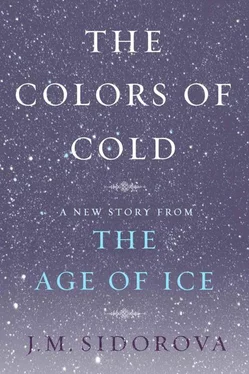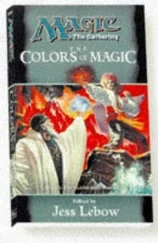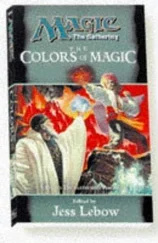Finally, Marquis’s speech draws to a climax. Spectacles perched on his nose, his liver-spotted hands fingering a leather tome, he regales the audience with the tale of “a dear friend, the distinguished French scientist Monsieur Pictet,” who discovered—“proving wrong that traitor to the French people, Lavoisier”—the “scientifically advanced, magic radiant rays of frigorific cold,” and taught them to “your humble servant.”
“Cold is not a mere absence of heat, mesdames and messieurs. You are about to see the power of radiant cold with your very own eyes. You will see the birth of the snow maiden, like Venus from sea foam. I present to you my favorite and brightest pupil, the esteemed protégée of the prime minister to the Elector Theodor of Bavaria, the distinguished Count Rumford of the Holy Roman Empire—the incomparable! Mademoiselle! Froid!”
She is not Count Rumford’s protégée. The Holy Roman Empire no longer exists, and poor Lavoisier had done nothing wrong other than insisting heat is made of particles. Marquis is not Pictet’s friend, a once-upon-a-time acquaintance, at best. But this is the Palais-Royal. What passes for truth here is different.
As she walks out and bows to the applause, he bumbles offstage, picks up his violin, and launches into a sonata.
She steps into a small circle chalked on the floor, which marks the focal point of one of the tin mirrors. Her job is to undress.
* * *
She looks into the faces of her spectators, searches for one or two whose stare will make her most uncomfortable. Perhaps this man, the one who’s just said that her act belongs on two floors at once? He looks like a hungry weasel in a man’s body. Or—this old, gaunt woman in round spectacles, poised on the edge of her seat like a lizard on a hunt? They stare, and Cherie stares back, slowly unwrapping her shawl. She wants them to wake a memory in her—no, make her relive the moment from her past: she, a ten-year-old, standing naked on the dissection table of an old anatomy theater. Bawling.
But the memory does not come alive.
She can try another way. She turns her eyes to Marquis, fiddling away his Vivaldi or Pisendel, bouncing on his seventy-year-old knees. He never looks back at her during this, never. He just dips and rocks, bow legs in silk stockings, everything from his coat to wig, to the cross of the defunct Order of the Holy Ghost on his chest—already a twenty-year anachronism. You look like a clown, old man , she tells him in her mind and recalls his reply, I am a clown. A dress of distinction becomes a shroud of doom becomes a clown’s costume. O Clio, so full of mischief.
She reaches out to that memory of the anatomy theater. She feels a kindling of what she calls a red upset , the color of her papier-mâché flower Effleurer . She recalls Marquis in that anatomy theater, his younger self, standing cross-armed, talking with another man, eyeing her over his haughty, aquiline nose.
The red upset grows more acute. Yet treacherously, her mind backflips to another memory: her asking Marquis not so long ago, How did you survive? Twenty years back they used to kill for less than flaunting the Order of the Holy Ghost cross. Weren’t you friends with Philippe Égalité when he was a duke? And they executed him, didn’t they, dragged him through the Palais, tried him and guillotined him in under two days!
She remembers his wry smile. He said, Duke of Orléans thought if he’d open half of his palace to the mob, it won’t gobble the rest. What a fool. How did I survive? By walking away from everything I had before they’d take it from me.
He had been a real marquis before the Revolution. She may have been his bastard child. She can’t be certain. She was too small to remember, and his memory changes with years. Most of the time he’d say, You are a foundling, they dropped you at my door. Sometimes: I ran into you on the streets, Cherie, near the Place Louis Quinze. I was there to watch the beheading of Madame du Barry. It was December 1793. You must have toddled out of some house. You had only your little diaper and bonnet on. There had been massacres. You were so cold my hands ached when I picked you up.
And once, he said, If I was meant to lose everything to find you, I don’t regret it.
She sneaks a glance across the stage, in time to see that a few snowflakes have appeared in the focal point of the other mirror. If someone placed a thermometer in that focal point, as Monsieur Pictet had years ago, it would have registered a dip in temperature: the rays of her cold reflected from one mirror onto another.
The snowflakes—too few, alas—drift, unnoticed by the spectators, to the floor. Her upset is blue. It does make her cold, but not cold enough.
But she still has time, she thinks, and the full attention of her audience. She knows how to be slow, when needed. It took her two minutes to unbutton and remove her jacket. It is a performance, not a denudement. Not yet.
* * *
And still. A human being gets used to anything, don’t they say? That is the problem.
Her mind returns to Julien, the one-legged veteran. He must have been about the same age as she. He must have been handsome before he’d left for war. Now his face was a face of misery. Still, he came as a paying patron; so she stepped so close to him she could brush against his leg stump with her thigh, and she told him one of her tales, the one she’s told a hundred times before. It was just a little something for the mood, something that went well with her Touch Lightly flower. “You’ve heard the lore,” she said to Julien, “how, before she met her doom, Louis’s mistress, Madame du Barry, pled to the guillotinemaster, ‘ Encore un moment !’ Just one moment please! Well, that night the death mask makers went among the executed, scavenging for heads of the rich and famous. Everyone knew that du Barry’s death mask would sell for a hefty profit. One woman, Tussaud her name, found du Barry’s body lying on the ground, one arm out, another tucked in, bent at the elbow, and wound around that arm was a blood-stained sack. In it was the body’s severed head. Tussaud pulled and pulled at the sack, but the body held on, like it was dear to it.”
She could see misery on Julien. She could smell it. Yet she went on. “The mask maker stopped to catch her breath and then saw that all the mud around the body was covered with scribbles. The same three words, over and over again, ‘ Encore un moment. ’ Do you want to know what happened next?”
He nodded sharply. She eased his hand out of its grip on the crutch. He shivered. She peeled back his sleeve. His wrist was thin like a girl’s. She turned it vein side up. She said, “As soon as Tussaud noticed that she stood in a halo of writing, surrounded with words on all sides, at once the headless corpse’s hands fumbled to find her arm. When it succeeded, it traced—” She scribed on his wrist with the pointy tip of her gloved nail—over his vein, shaped like a windblown sapling, over his racing pulse, up and up his forearm, Encore un moment.
He sucked in a breath. She kneeled between his leg and his stump. She walked her fingertips back into his palm and curled them in it. Another shiver passed through his arm and hand and broke in her fingers. She squeezed back. “Your flower says Effleurer . Do you want to do what you came here for? Do you want to touch me?”
* * *
She makes a slow turn, unbuttoning her dress. She tilts her head like the Venus de Milo, the grimy replica cast of Venus that is over by the entrance. It is tempting to think of herself as a marble nude out on display in a public place, insensitive to eyes and hands, to revolutions and wars. But that is exactly what she cannot afford to think.
Читать дальше












